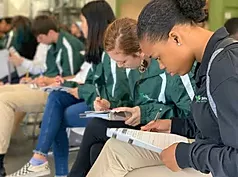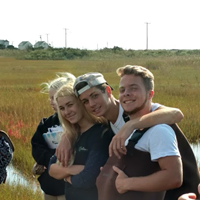Expedition Descriptions
Grade 9 - Food for Thought
Students explore the topic of food through a variety of lenses. Students learn about the origin and dynamics of their local,  global, and historical food systems. As students read The Omnivore’s Dilemma, they investigate and discuss food production, healthy food choices, and the differences between local, industrial, organic food systems. In History class, students explore the origins of agriculture through various civilizations. Each student creates a film which details their personal interpretation of how human civilization moved from a society of hunter gatherers to one of farming and agriculture. In Environmental Physics, topics including the use of Geographical Information Systems (GIS) help students interpret data pertaining to different layers of soil and create maps. During fieldwork experiences, students visit local organic and conventional farms to test soil and gather further data. Students learn about energy transformation through the design and construction of solar cookers. The expedition culminates in the 100-Mile Radius fundraising dinner that students plan, prepare, and execute in a week-long intensive class.
global, and historical food systems. As students read The Omnivore’s Dilemma, they investigate and discuss food production, healthy food choices, and the differences between local, industrial, organic food systems. In History class, students explore the origins of agriculture through various civilizations. Each student creates a film which details their personal interpretation of how human civilization moved from a society of hunter gatherers to one of farming and agriculture. In Environmental Physics, topics including the use of Geographical Information Systems (GIS) help students interpret data pertaining to different layers of soil and create maps. During fieldwork experiences, students visit local organic and conventional farms to test soil and gather further data. Students learn about energy transformation through the design and construction of solar cookers. The expedition culminates in the 100-Mile Radius fundraising dinner that students plan, prepare, and execute in a week-long intensive class.
 global, and historical food systems. As students read The Omnivore’s Dilemma, they investigate and discuss food production, healthy food choices, and the differences between local, industrial, organic food systems. In History class, students explore the origins of agriculture through various civilizations. Each student creates a film which details their personal interpretation of how human civilization moved from a society of hunter gatherers to one of farming and agriculture. In Environmental Physics, topics including the use of Geographical Information Systems (GIS) help students interpret data pertaining to different layers of soil and create maps. During fieldwork experiences, students visit local organic and conventional farms to test soil and gather further data. Students learn about energy transformation through the design and construction of solar cookers. The expedition culminates in the 100-Mile Radius fundraising dinner that students plan, prepare, and execute in a week-long intensive class.
global, and historical food systems. As students read The Omnivore’s Dilemma, they investigate and discuss food production, healthy food choices, and the differences between local, industrial, organic food systems. In History class, students explore the origins of agriculture through various civilizations. Each student creates a film which details their personal interpretation of how human civilization moved from a society of hunter gatherers to one of farming and agriculture. In Environmental Physics, topics including the use of Geographical Information Systems (GIS) help students interpret data pertaining to different layers of soil and create maps. During fieldwork experiences, students visit local organic and conventional farms to test soil and gather further data. Students learn about energy transformation through the design and construction of solar cookers. The expedition culminates in the 100-Mile Radius fundraising dinner that students plan, prepare, and execute in a week-long intensive class.Grade 10 - Nature and Society
Students explore the relationship between nature and early European, American, and Native American societies. Students tracex the legacy of “contact” in the 1600s through the Indian Wars, Transcendentalist Movement, and creation of the Reservation system. Place-based learning brings students into the woods for a kick-off immersion which examines the natural world through the lens of different worldviews and reflects on contrasting relationships towards the natural world. Students explore how the ecology of New England changes through contact and how a society evolved. The final product for this expedition is a performance of snapshot plays (also known as “vignettes”). Students create historically accurate vignettes with engaging dialog, compelling characters, and clear themes which pertain to the perspectives of that time. In chemistry class, students research and explore various molecular level properties of chemical substances that changed humanities’ relationship with nature. This case study culminates with a project in which students compose songs or poems about how different materials that have unique and important chemical properties that make them essential to society. Students present their final learning from the expedition in front of an authentic audience which in the past has included middle school students and staff.
Grade 11 - The C.O.D.E.
Race relations, DNA, and African American literature serves as the foundation of the Junior expedition, while workshop  opportunities allow students to explore the history of the civil rights movement, cell biology and the human genome project, the eugenics movement, and the Harlem Renaissance. A four day fieldwork experience in New York City provides them the chance to apply their learning. Opportunities afforded by visiting Ellis Island, the Museum of Chinese in America, Harlem, and the Museum of Natural History (and even the opportunity of navigating through a diverse and modern city) enlighten the learning that takes place in our classrooms throughout the semester. In being a part of this expedition, we encourage our students to become meaningful and aware citizens, a goal that is fully realized when they are taken out of their comfort zone and into the real world.
opportunities allow students to explore the history of the civil rights movement, cell biology and the human genome project, the eugenics movement, and the Harlem Renaissance. A four day fieldwork experience in New York City provides them the chance to apply their learning. Opportunities afforded by visiting Ellis Island, the Museum of Chinese in America, Harlem, and the Museum of Natural History (and even the opportunity of navigating through a diverse and modern city) enlighten the learning that takes place in our classrooms throughout the semester. In being a part of this expedition, we encourage our students to become meaningful and aware citizens, a goal that is fully realized when they are taken out of their comfort zone and into the real world.
 opportunities allow students to explore the history of the civil rights movement, cell biology and the human genome project, the eugenics movement, and the Harlem Renaissance. A four day fieldwork experience in New York City provides them the chance to apply their learning. Opportunities afforded by visiting Ellis Island, the Museum of Chinese in America, Harlem, and the Museum of Natural History (and even the opportunity of navigating through a diverse and modern city) enlighten the learning that takes place in our classrooms throughout the semester. In being a part of this expedition, we encourage our students to become meaningful and aware citizens, a goal that is fully realized when they are taken out of their comfort zone and into the real world.
opportunities allow students to explore the history of the civil rights movement, cell biology and the human genome project, the eugenics movement, and the Harlem Renaissance. A four day fieldwork experience in New York City provides them the chance to apply their learning. Opportunities afforded by visiting Ellis Island, the Museum of Chinese in America, Harlem, and the Museum of Natural History (and even the opportunity of navigating through a diverse and modern city) enlighten the learning that takes place in our classrooms throughout the semester. In being a part of this expedition, we encourage our students to become meaningful and aware citizens, a goal that is fully realized when they are taken out of their comfort zone and into the real world.Grade 12 - Our Place by the Sea
This expedition involves a year-long curriculum on sustainable development examined through the lens of past, current, and  future threats to key marine species. The curriculum introduces students to GIS/GPS science and mapping, along with engaging them in fieldwork visiting current restoration projects and the agencies that lead them. The final product is a model accompanied by geospatial maps of areas along the Atlantic coast, with data specific to restoration projects and key marine species essential to the area’s economy. In addition, a group of students will be engaged in writing and illustrating children’s literature texts which tell stories of herring, eels, and striped bass populations. The texts will accompany students as they develop and deliver instruction to other RI schools. The models and accompanying storybooks will be available to loan to educational institutions in Rhode Island. Fieldwork for this expedition includes an immersion camping on Block Island, visits to New Bedford and the New Bedford Whaling Museum, the port of Galilee and the town of Narragansett, a cruise on Newport Harbor, and various learning experiences in and around Narragansett Bay.
future threats to key marine species. The curriculum introduces students to GIS/GPS science and mapping, along with engaging them in fieldwork visiting current restoration projects and the agencies that lead them. The final product is a model accompanied by geospatial maps of areas along the Atlantic coast, with data specific to restoration projects and key marine species essential to the area’s economy. In addition, a group of students will be engaged in writing and illustrating children’s literature texts which tell stories of herring, eels, and striped bass populations. The texts will accompany students as they develop and deliver instruction to other RI schools. The models and accompanying storybooks will be available to loan to educational institutions in Rhode Island. Fieldwork for this expedition includes an immersion camping on Block Island, visits to New Bedford and the New Bedford Whaling Museum, the port of Galilee and the town of Narragansett, a cruise on Newport Harbor, and various learning experiences in and around Narragansett Bay.
 future threats to key marine species. The curriculum introduces students to GIS/GPS science and mapping, along with engaging them in fieldwork visiting current restoration projects and the agencies that lead them. The final product is a model accompanied by geospatial maps of areas along the Atlantic coast, with data specific to restoration projects and key marine species essential to the area’s economy. In addition, a group of students will be engaged in writing and illustrating children’s literature texts which tell stories of herring, eels, and striped bass populations. The texts will accompany students as they develop and deliver instruction to other RI schools. The models and accompanying storybooks will be available to loan to educational institutions in Rhode Island. Fieldwork for this expedition includes an immersion camping on Block Island, visits to New Bedford and the New Bedford Whaling Museum, the port of Galilee and the town of Narragansett, a cruise on Newport Harbor, and various learning experiences in and around Narragansett Bay.
future threats to key marine species. The curriculum introduces students to GIS/GPS science and mapping, along with engaging them in fieldwork visiting current restoration projects and the agencies that lead them. The final product is a model accompanied by geospatial maps of areas along the Atlantic coast, with data specific to restoration projects and key marine species essential to the area’s economy. In addition, a group of students will be engaged in writing and illustrating children’s literature texts which tell stories of herring, eels, and striped bass populations. The texts will accompany students as they develop and deliver instruction to other RI schools. The models and accompanying storybooks will be available to loan to educational institutions in Rhode Island. Fieldwork for this expedition includes an immersion camping on Block Island, visits to New Bedford and the New Bedford Whaling Museum, the port of Galilee and the town of Narragansett, a cruise on Newport Harbor, and various learning experiences in and around Narragansett Bay.